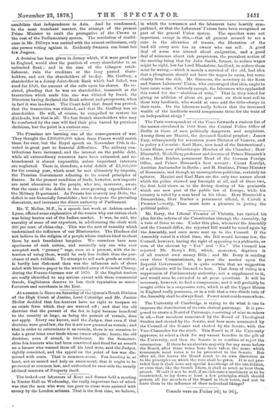Mr. Berry, the Liberal Premier of Victoria, has carried his
plan for the reform of the Constitution through the Assembly, by a vote of three to one. Under this plan, whenever the Assembly and the Council differ, the rejected Bill would be voted again by the Assembly, and once more sent up to the Council. If the Assembly voted it a third time, the Bill would become law, the Council, however, having the right of appealing to a plebiscite, or vote of the electors by " Yes" and " No." The Council has rejected Mr. Berry's Bill, which, moreover, deprives it of all control over money Bills ; and Mr. Berry is sending over three Commissioners, to press the matter upon the Imperial Government. It is quite certain that no suggestion of a plebiscite will be listened to here. That form of ruling is a suppression of Parliamentary authority, not a supplement to it, and would soon be extended to all great questions. It will be necessary, however, to find a compromise, and it will probably be sought either in a suspensive veto, which is all the Upper House in England really possesses, or in a rule that a two-thirds vote of the Assembly shall be always final. Power must reside somewhere.


































 Previous page
Previous page